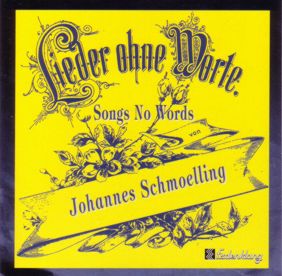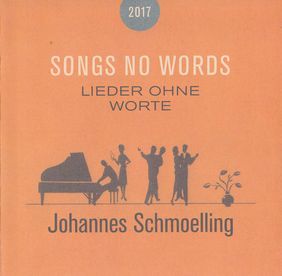 |  | |||||||||||||||||||||
Johannes Schmoelling Songs No WordsLieder ohne Worte- Studio, released 1995 - | |||||||||||||||||||||||||||||||||||||||||||||||||||||||||||||||||||||||||||||||||
Covers |
| ||||||||||||||||||||||||||||||||||||||||||||||||||||||||||||||||||||||||||||||||
Tracks |
| ||||||||||||||||||||||||||||||||||||||||||||||||||||||||||||||||||||||||||||||||
Details |
| ||||||||||||||||||||||||||||||||||||||||||||||||||||||||||||||||||||||||||||||||
Notes | Five years after his previous studio album, White Out, a new solo release by Johannes Schmoelling was finally published in 1995. Recorded between 1992 and 1994 the album release was postponed due to the disease and death of Peter Wirths, long-time friend and producer of some of Johannes Schmoelling's music and radio plays. | ||||||||||||||||||||||||||||||||||||||||||||||||||||||||||||||||||||||||||||||||
For this reason, Johannes Schmoelling had to start efforts again to prepare the release of the CD. He had finished work on the music material already in 1992, and wherever Wirths tried to offer the recording, the companies answered something like: "Yes, very nice, but it does not fit into our repertoire." Finally, Johannes Schmoelling returned back to the Erdenklang label that had already published his debut album Wuivend Riet (1986) to release Songs No Words. | |||||||||||||||||||||||||||||||||||||||||||||||||||||||||||||||||||||||||||||||||
Johannes Schmoelling himself about this album: "Certain sections of the music in Songs No Words are meant to be a mixture of two music styles. The classical-romantic music of the 19th century and the popular electronic music of the present. Pieces such as Hymnus or Funeral March are examples of this. It is my attempt to combine traditional instruments such as the piano, the clarinet or string instrument, including traditional melodies and harmonies, with electronically generated sounds from synthesizers and samplers, and modern rhythms. This resulted in new stereophonic sounds. Virtual stereophonics produced by the electronic music are combined to the known and experienced stereophonics of traditional music (the so called, 'classical music'). In turn, the sound achieves more depth and scope, stereophonics and composition become equal partners during the production of music. The title of the CD Songs No Words, and the individual tracks, are based on the style from the piano album Lieder ohne Worte by Felix Mendelssohn-Bartholdy, published in 1834." | |||||||||||||||||||||||||||||||||||||||||||||||||||||||||||||||||||||||||||||||||
The CD starts with the children's song Nursery Rhyme, a plain and simply arranged ballad, composed after a telephone call from Johannes Schmoelling's son Jonas. Gondola Song is based on the Venetian Gondola Song by Mendelssohn Bartholdy. The 6/8 rhythm is also borrowed from him. The drums on this and two other tracks are played by Jan Seliger to "maintain a slow and steady rhythm", according to Schmoelling. Spinning Wheel, also from the piano album, is programmatically a series of short, opposing loops -- some kind of minimal music. Jester's Nightwatch is a different mix of the composition Galago that had been released on a Dutch music sampler prior to this album. The Autumn Song should promote a contemplative and peaceful mood and is based on a musical fragment that was composed for mountaineer Reinhold Messner's lectures and is followed by the Huntsman's Song. The idea behind the track Hymnus emerged after Johannes Schmoelling visited Jerusalem in 1991. The sound environment for the introduction was recorded directly on-site at the Wailing Wall. The Maypole Song is Schmoelling's interpretation of the dance around the maypole, realised musically with timbre and analog instruments from the eighties, and also accompanied by a touch of gamelan style of music from the Bali region. The album closes with the Funeral March that takes up and reprocesses themes from Hymnus. | |||||||||||||||||||||||||||||||||||||||||||||||||||||||||||||||||||||||||||||||||
The 2017 Re-Recording | |||||||||||||||||||||||||||||||||||||||||||||||||||||||||||||||||||||||||||||||||
22 years after its original release, in 2017, Johannes Schmoelling competely remixed the album and re-released it on his own Viktoriapark label -- similarly as he had done with his albums The Zoo Of Tranquillity in 1998 and White Out in 2000. | |||||||||||||||||||||||||||||||||||||||||||||||||||||||||||||||||||||||||||||||||
The tracks were not completely re-recorded but merely re-arranged and remixed: thus some sections do not differ very much from their original recording while others are different enough to make the album a very worthwhile addendum to the collection of every fan of Schmoellings's solo work. | |||||||||||||||||||||||||||||||||||||||||||||||||||||||||||||||||||||||||||||||||
There are quite a number of subtle changes, one of the most prominent being the start of the first track: On the original album JS's little son Jonas could be heard leaving a note on the answering machine, asking his father to bring a certain record by Phil Collins with him. On the re-release the now adult man Jonas asks his father to bring his new album Songs No Words (!) along when coming to Berlin. | |||||||||||||||||||||||||||||||||||||||||||||||||||||||||||||||||||||||||||||||||
The track listing has been altered by slightly renaming the compositions (now all tracks match the pattern The .... Song), changing the order of some of the original tracks and replacing the composition Maypole Song by the completely new track The Piper Man's Song, recorded in 2015. | |||||||||||||||||||||||||||||||||||||||||||||||||||||||||||||||||||||||||||||||||
Furthermore, the re-release comes with new artwork. The cover illustration of the 4-page booklet is taken from a German piano album from 1959 (while the original was held in the style of some 19th century sheet music). | |||||||||||||||||||||||||||||||||||||||||||||||||||||||||||||||||||||||||||||||||
Releases |
| ||||||||||||||||||||||||||||||||||||||||||||||||||||||||||||||||||||||||||||||||
Copyright/Disclaimer © 2001-2025 by Michael Berling. Last Update: 2025-01-03 17:20 |



